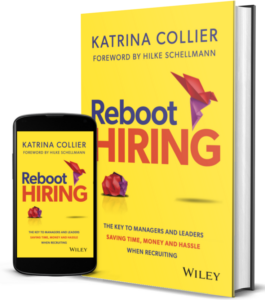Initially, hiring is personal!
Think about it. It’s your partnership with the manager, your understanding of who they need to hire, and your job to go and find them. You then engage, woo, convert, reassure, support, cajole and more to convert them from a prospect to an employee.
It’s your sweat equity that makes hiring personal.
People I recruited 20 years ago still thank me. Many of my old contractors are friends. They have long forgotten which agency I worked for, but remember my name and how I made them feel. Over the years, I’ve even been in my client’s homes, and I don’t mean via Zoom!
Hiring being personal is one reason our biases are questioned and HR tech vendors offer solutions, which they claim are not. Some vendors seek to rank candidates based on personality, which makes me curious as to who is accurately teaching managers how to define which personality traits ensure productivity or success… ⚠️
But I will leave that can of worms for another time. 🥫🪱
I received this feedback from the ever-fabulous Georgina Kelly, after the inaugural BRAINCAMP for People & Talent Leaders last week. It got me thinking.
It was such a pleasure to catch up with the powerhouse that is Katrina. The event was a reminder of her incredible ability to create an inclusive environment for authentic and practical knowledge sharing among peers. – Georgina Kelly
We ensured a diverse line-up, which meant that when Aylin, Glenn and I promoted the event or invited people they, consciously or not, saw people like them on the agenda. Until I read Georgina’s words, though, I had not appreciated the impact: it meant that the attendees felt safe. They were open, vocal, creative, energetic, and vulnerable.
It was magical! (We cannot wait for the next ones!)
Louise Triance and I always strive for diversity across our events. So we are regularly frustrated seeing yet another white manel for an event or webinar, because over the years we have invested hours convincing those less represented that they are safe on our stages. It is hard work but representation matters and with comments like Georgina’s, it’s worth it.
The speakers are as qualified and experienced. They have earned their place.
Back to why hiring is personal…
Even if your company slashes its DEI programme, your job is to present appropriately qualified and experienced candidates for the role; established in the recruitment alignment meeting (kick-off), and assessed throughout the interview process. It is between you and your hiring manager to decide who is the most qualified for the role.
I get it. Few in talent acquisition feel safe in their roles right now; the 2020s have been tough and now diversity, equity and inclusion are being demonised.
However, your job is to ensure that your company hires the people who will help the company flourish while abiding by your country’s laws. Leaders will soon understand the importance of what you do if they are slapped with a lawsuit for discrimination (or you could drop Reboot Hiring on their desk and I’ll explain its importance for you.).
Legalities aside, if you see the benefit of attracting a diverse pool of candidates, truly, will anyone know if you continue sourcing from a wide-ranging pool of qualified applicants? Plus, would you want to stay in a company that micro-manages you to the extent that your matching qualified and suitably experienced candidates are rejected based on gender, ethnicity, neurodiversity, sexuality, disability, etc. alone?
As Gerry Cripsin wrote eloquently here, ‘Collectively we need to raise our voice and take affirmative steps to move forward in 2025. I do not want to go back to 1965.’
That voice might be contacting that qualified and experienced prospect who would be a great asset to the company but isn’t from the same red-brick university, social class, or background. Maybe it’s challenging assumptions made over neurodiversity or gender by presenting suitably qualified and experienced candidates anyway. And so on.
Hiring is personal.
Because you are the start of the hiring process.
You are the door to your company.
Your job is to help managers and leaders recruit those who help the company succeed, and plenty of research supports the benefits to productivity of a diverse workforce.
20 years ago I could only access the people in my agency’s database, LinkedIn’s 1.5 million users (that’s million not billion), and whoever applied via a job board. Today, 5 billion people use social media, and with a little know-how, they can all be contacted. Sure some are harder to find than others but your ability to produce a suitably experienced and qualified diverse list of candidates for your hiring manager is only limited by your ability to source.
It might take courage but knowing you didn’t deny someone an opportunity based solely on an -ism or phobia, besides being potentially illegal, will increase your job satisfaction.
However, if you are happy breaking laws and rejecting qualified people based solely on their diversity consider a career change.

